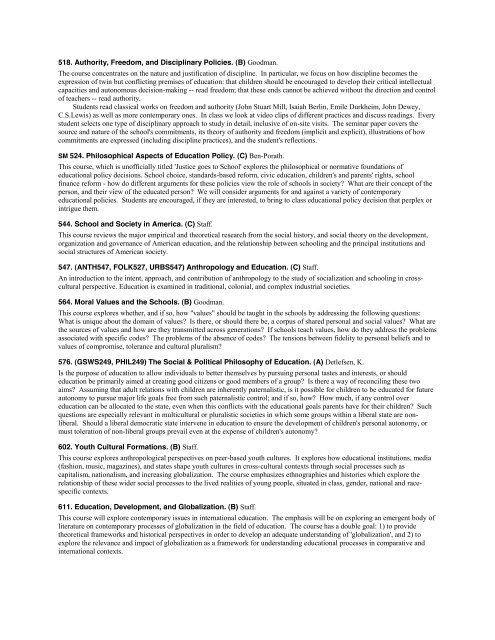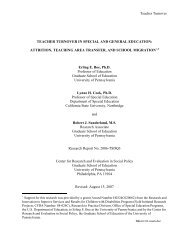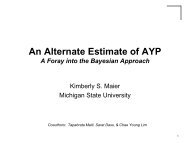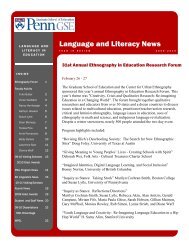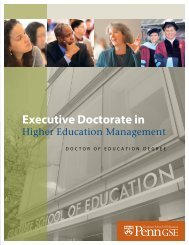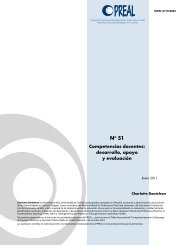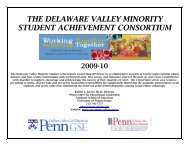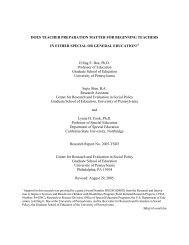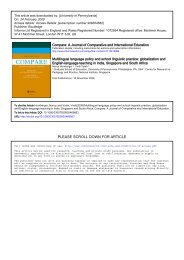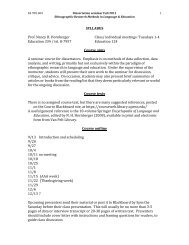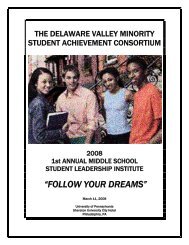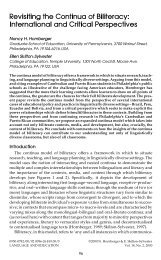EDUCATION (ED) {EDUC} - Penn GSE
EDUCATION (ED) {EDUC} - Penn GSE
EDUCATION (ED) {EDUC} - Penn GSE
You also want an ePaper? Increase the reach of your titles
YUMPU automatically turns print PDFs into web optimized ePapers that Google loves.
518. Authority, Freedom, and Disciplinary Policies. (B) Goodman.<br />
The course concentrates on the nature and justification of discipline. In particular, we focus on how discipline becomes the<br />
expression of twin but conflicting premises of education: that children should be encouraged to develop their critical intellectual<br />
capacities and autonomous decision-making -- read freedom;; that these ends cannot be achieved without the direction and control<br />
of teachers -- read authority.<br />
Students read classical works on freedom and authority (John Stuart Mill, Isaiah Berlin, Emile Durkheim, John Dewey,<br />
C.S.Lewis) as well as more contemporary ones. In class we look at video clips of different practices and discuss readings. Every<br />
student selects one type of disciplinary approach to study in detail, inclusive of on-site visits. The seminar paper covers the<br />
source and nature of the school's commitments, its theory of authority and freedom (implicit and explicit), illustrations of how<br />
commitments are expressed (including discipline practices), and the student's reflections.<br />
SM 524. Philosophical Aspects of Education Policy. (C) Ben-Porath.<br />
This course, which is unofficially titled 'Justice goes to School' explores the philosophical or normative foundations of<br />
educational policy decisions. School choice, standards-based reform, civic education, children's and parents' rights, school<br />
finance reform - how do different arguments for these policies view the role of schools in society? What are their concept of the<br />
person, and their view of the educated person? We will consider arguments for and against a variety of contemporary<br />
educational policies. Students are encouraged, if they are interested, to bring to class educational policy decision that perplex or<br />
intrigue them.<br />
544. School and Society in America. (C) Staff.<br />
This course reviews the major empirical and theoretical research from the social history, and social theory on the development,<br />
organization and governance of American education, and the relationship between schooling and the principal institutions and<br />
social structures of American society.<br />
547. (ANTH547, FOLK527, URBS547) Anthropology and Education. (C) Staff.<br />
An introduction to the intent, approach, and contribution of anthropology to the study of socialization and schooling in crosscultural<br />
perspective. Education is examined in traditional, colonial, and complex industrial societies.<br />
564. Moral Values and the Schools. (B) Goodman.<br />
This course explores whether, and if so, how "values" should be taught in the schools by addressing the following questions:<br />
What is unique about the domain of values? Is there, or should there be, a corpus of shared personal and social values? What are<br />
the sources of values and how are they transmitted across generations? If schools teach values, how do they address the problems<br />
associated with specific codes? The problems of the absence of codes? The tensions between fidelity to personal beliefs and to<br />
values of compromise, tolerance and cultural pluralism?<br />
576. (GSWS249, PHIL249) The Social & Political Philosophy of Education. (A) Detlefsen, K.<br />
Is the purpose of education to allow individuals to better themselves by pursuing personal tastes and interests, or should<br />
education be primarily aimed at creating good citizens or good members of a group? Is there a way of reconciling these two<br />
aims? Assuming that adult relations with children are inherently paternalistic, is it possible for children to be educated for future<br />
autonomy to pursue major life goals free from such paternalistic control;; and if so, how? How much, if any control over<br />
education can be allocated to the state, even when this conflicts with the educational goals parents have for their children? Such<br />
questions are especially relevant in multicultural or pluralistic societies in which some groups within a liberal state are nonliberal.<br />
Should a liberal democratic state intervene in education to ensure the development of children's personal autonomy, or<br />
must toleration of non-liberal groups prevail even at the expense of children's autonomy?<br />
602. Youth Cultural Formations. (B) Staff.<br />
This course explores anthropological perspectives on peer-based youth cultures. It explores how educational institutions, media<br />
(fashion, music, magazines), and states shape youth cultures in cross-cultural contexts through social processes such as<br />
capitalism, nationalism, and increasing globalization. The course emphasizes ethnographies and histories which explore the<br />
relationship of these wider social processes to the lived realities of young people, situated in class, gender, national and racespecific<br />
contexts.<br />
611. Education, Development, and Globalization. (B) Staff.<br />
This course will explore contemporary issues in international education. The emphasis will be on exploring an emergent body of<br />
literature on contemporary processes of globalization in the field of education. The course has a double goal: 1) to provide<br />
theoretical frameworks and historical perspectives in order to develop an adequate understanding of 'globalization', and 2) to<br />
explore the relevance and impact of globalization as a framework for understanding educational processes in comparative and<br />
international contexts.


